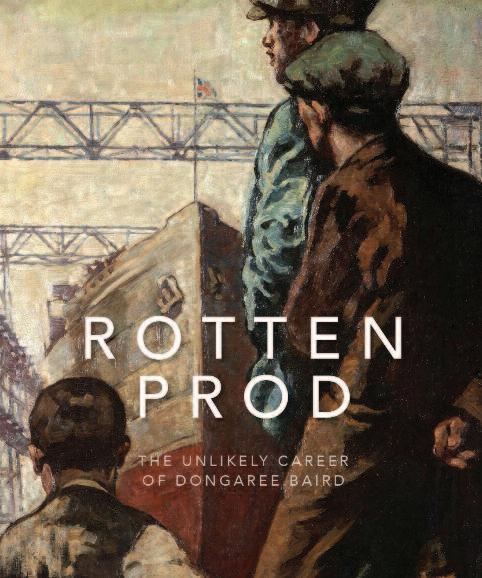
3 minute read
Rotten Prod
By Emmet O’Connor UCd Press, 1922
Reviewed by Amy Ferguson
Emmet O’Connor ’s Rotten Prod: The Unlikely Career of Dongaree Baird is an academic historical monograph situated in a period of histor y that can be ver y useful for the contemporar y socialist to study It was a period when a rising workers’ movement and a heating-up of sectarian tensions car ved spots side -by-side in the political landscape In covering the dramatic life of James ‘Dongaree’ Baird, O’Connor examines the political forces and considerations behind the Belfast shipyard expulsions of 1912 and 1920, during which, thousands of Catholics, along with Protestant trade unionists and socialists, were driven out of their homes and workplaces by loyalist gangs.
It is difficult, in the space of such a shor t review, to cover all interesting and impor tant aspects contained within this book, but I will focus on some key points
This book illustrates that the value of the stor y of Baird stems from the fact that, in many cases, he was not a par ticularly unique ‘Rotten Prod’ He was one of hundreds of workers from protestant backgrounds who became radicalised by the 1919 Engineering Strike (or with older translations of the Tirukkural would allow the reader to see the true breadth of her changes
The Book of D esire is a collec tion of emotionally rich love poetr y that transcends time and place. Each verse is replete with sincerit y and invites the reader into a nuanced relationship that is full to the brim with feeling. K andasamy ’s introduc tion, which I have alluded to, presents a thoughtful and highly researched exposition of the histor y of the Tirukkural and its role in language -based oppression and cultural misogyny, both of which have been historically used to bolster casteist ideology.
Her decision to publish her translation, a projec t she had been wor k ing on for a decade, was largely infor med by the absence of Tamil women in the book ’s previous translations and commentar ies: “D oes this woman ever exist outside of the tex t?” O dd, she obser ves, for a wor k that is so concer ned with them Her feminist translation is a watershed moment for classic literature and her inter ventionist approach cannot be understated I t takes the Tiruk kural straight from the hands of revisionists who attempted for centur ies to distor t a book so admired for its openness, declar ing in k ural 972: “all lives are equal af ter bir th ”n
‘Belfast Soviet ’ as it is occasionally referred to), or the conditions that created it, and by the conser vatism of the British amalgamated and craft unions Where Baird was unique was in the public presentation of his politics: from ar ticles and polemics against private land ownership, in his suppor t for socialism, to representing working- class Belfast as a representative on the municipal council It was during his role as a councillor that he developed the ‘Dongaree’ nickname by attending meetings straight after work, donning his shipyard uniform, much to the distaste of well-to- do establishment politicians
Fascinatingly, Baird got a taste of two ver y different forms of labour organising in Ireland, from industrial Belfast to the more rural Water ford; from the shipyards to farm labourers In the latter, Baird found himself caught between the radical demands of the labourers, and the cautious approach of the ITGWU leadership. Baird was popular amongst the labourers and slammed as a ‘Bolshevist ’ by the big farmers’ association, but it was precisely because of his ‘Bolshevist ’ politics that he was so popular amongst the labouring population in the first place. This is also a reminder that the call for democratic rank-and-file -led trade unionism has been a vital principle and practical necessity throughout the histor y of the workers’ movement.
In 1912 and 1920, the Belfast workforce was rocked by violent expulsions from homes and workplaces at the hands of loyalist gangs What made these expulsions different from previous ones was that both Catholic and a significant minority of Protestant workers were victims While Catholics were targets because of their religion, Protestants were targeted if they were seen as par ticularly militant trade unionists or socialists. They were given the name ‘Rotten Prods’; Protestants who betrayed their expected loyalty to unionist politics
So why did such expulsions occur? The context was the resurgence of labour politics in the city, that was drawing together workers of all backgrounds in their common class interests, especially, but not exclusively, on the question of wages, and causing workers to draw quite radical socialist conclusions. For instance, on May Day 1919, 100,000 workers attended a march and rally at which they voted to suppor t the revolutionar y workers of Russia against western imperialist inter vention. Such ideas posed an existential threat, not










